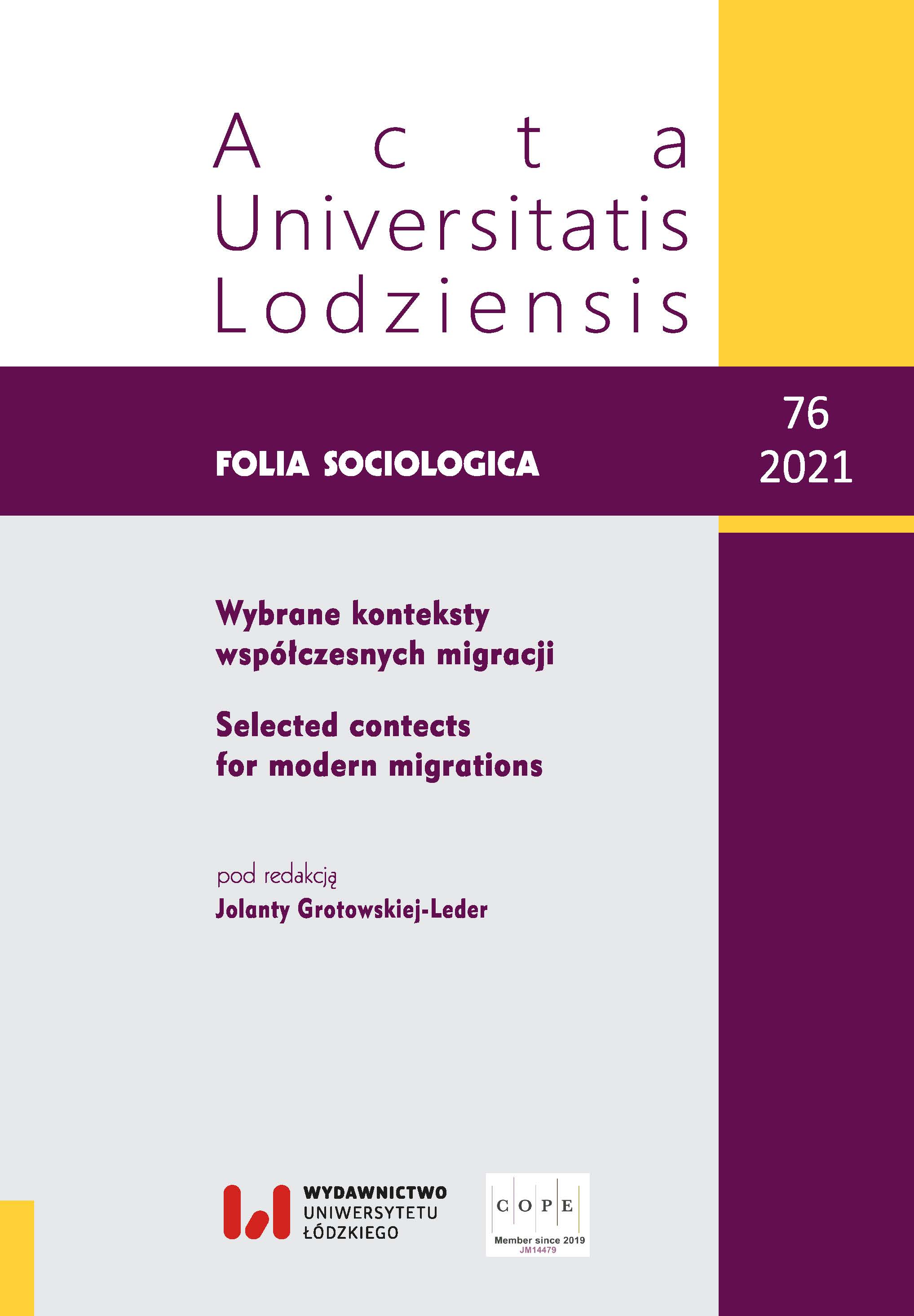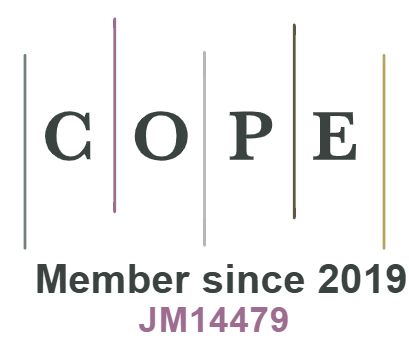Amerykańska meksykańska rodzina imigrantów w zmieniającym się społeczeństwie: krytyczny przegląd
DOI:
https://doi.org/10.18778/0208-600X.76.05Słowa kluczowe:
rodziny imigranckie, rodziny meksykańskie, rodziny amerykańskieAbstrakt
Artykuł przedstawia przegląd literatury dotyczącej zmian strukturalnych meksykańskiej rodziny imigrantów w Stanach Zjednoczonych. Na początku zaprezentowano krytyczny przegląd klasycznej literatury na temat meksykańskiej rodziny imigrantów, skoncentrowanej na modelach asymilacji, ich głównych problemach i ograniczeniach. Następnie, przesuwając punkt ciężkości, w opracowaniu zaprezentowano, jak modele nierówności strukturalnych i feministycznych, jako krytyczne podejścia do pojawiających się form rodzinnych imigrantów, mogą pomóc w zrozumieniu transformacyjnych podobieństw między społeczeństwem amerykańskim a strukturą meksykańskiej rodziny imigrantów.
W artykule zaprezentowano argumenty odnoszące się do strukturalnego zróżnicowania meksykańskiej rodziny. W ten sposób dyskusja została usytuowana w szerszym amerykańskim kontekście, co zwraca uwagę na to, jak historyczne i obecne siły społeczne związane z nierównym dostępem do pracy i możliwości edukacyjnych utrwaliły marginalizację meksykańskiej rodziny imigrantów w stosunku do rodziny mainstreamowej. W tekście przedstawiono również i omówiono, w jaki sposób ramy feministyczne, przekrojowe i postmodernistyczne kształtują obecne debaty na temat rodzin imigrantów. Omówiono ponadto, jak różnorodność pod względem struktury rodziny i życia rodzinnego przyczynia się do rozwoju studiów rodzinnych zarówno w USA, jak i na całym świecie.
Bibliografia
Aulette J.R. (2007), Changing American Families, Pearson, Boston.
Google Scholar
Baca Zinn M. (2000), Feminism and Family Studies for a New Century, “The Annals of the American Academy of Political and Social Sciences”, vol. 571, pp. 42–56.
Google Scholar
DOI: https://doi.org/10.1177/0002716200571001004
Baca Zinn M., Eitzen S., Wells B. (2008), Diversity in Families, Pearson, Boston.
Google Scholar
Baca Zinn M., Pok A. (2002), Tradition and Transition in Mexican-Origin Families, [in:] R.L. Taylor (ed.), Minority Families in the United States: A Multicultural Perspective, Prentice Hall, Upper Saddle River, New York, pp. 78–100.
Google Scholar
Baca Zinn M., Thornton Dill B. (2000), Theorizing Difference from Multiracial Feminism, [in:] M. Baca Zinn, P. Hondagneu-Sotelo, M. Messner (eds.), Gender through the Prism of Difference, Allyn and Bacon, Boston, pp. 23–29.
Google Scholar
Bean F.D., Brown S.K., Bachmeier J.D. (2015), Parents without Papers: The Progress and Pitfalls of Mexican American Integration, Russell Sage Foundation, New York.
Google Scholar
Bender S.W. (2003), Greasers and Gringos: Latinos, Law, and the American Imagination, New York University Press, New York.
Google Scholar
Bonilla-Silva E. (2006), Racism without Racists: Color-Blind Racism and the Persistence of Racial Inequality in the United States, Rowman & Littlefield Publishers, Lanham.
Google Scholar
Bustamante J.J. (2007), Mexican Communities and Acculturation: A Comparative Study of “El Valle Del Rio Grande” and Detroit’s “Mexican Town”, [in:] J. Santibañez, M.Á. Castillo (eds.), Nuevas Tendencias Y Nuevos Desafíos De La Migración Internacional: Memorias Del Seminario Permanente Sobre Migración Internacional, vol. II, El Colegio de la Frontera Norte, Sociedad Mexicana de Demografia, El Colegio de Mexico, Mexico City, pp. 367–382.
Google Scholar
DOI: https://doi.org/10.2307/j.ctv3dnq5h.16
Bustamante J.J. (2013), Transnational Struggles: Policy, Gender, and Family Life on the Texas-Mexico Border, LFB Academic Publishers, El Paso.
Google Scholar
Bustamante J.J., Alemán C. (2007), Perpetuating Split-Household Families: The Case of Mexican Sojourners in Mid-Michigan and Their Transnational Fatherhood Practices, “Migraciones Internacionales”, vol. 12(4), pp. 65–86.
Google Scholar
Carrillo J.F. (2016), Barrio Nerds: Latino Males, Schooling, and the Beautiful Struggle, Sense Publishers, Boston.
Google Scholar
DOI: https://doi.org/10.1007/978-94-6300-767-2
Chavez L.R. (1992), Shadowed Lives: Undocumented Immigrants in American Society, Harcourt Brace College Publishers, Fort Worth.
Google Scholar
Coontz S. (1992), The Way We Never Were: American Families and the Nostalgia Trap, BasicBooks, New York.
Google Scholar
De Genova N.P., Peutz N. (2010), The Deportation Regime: Sovereignty, Space, and the Freedom of Movement, Duke University Press, Durham.
Google Scholar
DOI: https://doi.org/10.2307/j.ctv120qtc1
DeWind J., Kasinitz P. (1997), Everything Old Is New Again? Processes and Theories of Immigrant Incorporation, “International Migration Review”, vol. 31(4), pp. 1096–1111.
Google Scholar
DOI: https://doi.org/10.1177/019791839703100412
Díaz-Guerrero R. (1975), Psychology of the Mexican: Culture and Personality, University of Texas Press, Austin.
Google Scholar
DOI: https://doi.org/10.7560/775121
Dreby J. (2015), Everyday Illegal: When Policies Undermine Immigrant Families, University of California Press, Berkeley.
Google Scholar
DOI: https://doi.org/10.1525/9780520959279
Ferreti G. (2017), Southern Inhospitality Latino Immigrant Attrition and Resistance in the South, [in:] M.G. Coffey, J. Skipper (eds.), Navigating Souths. Transdisciplinary Explorations of a U.S. Region, University of Georgia Press, Athens, pp. 87–100.
Google Scholar
DOI: https://doi.org/10.2307/j.ctt1g0b9f4.8
Fitzpatrick J.P. (1971), Puerto Rican Americans: The Meaning of Migration to the Mainland, Prentice Hall, Englewood Cliffs.
Google Scholar
Garey A.I., Hansen K.V. (1998), Introduction: Analyzing Families with a Feminist Sociological Imagination, [in:] K.V. Hansen, A.I. Garey (eds.), Families in the U.S.: Kinship and Domestic Politics, Temple University Press, Philadelphia, pp. XV–XXI.
Google Scholar
Giddens A. (2000), Runaway World: How Globalisation Is Reshaping Our Lives, Routledge, New York.
Google Scholar
Gorman C.S., Wilson B.R. (2021), After the Raid: Feminist Geolegality and the Spaces of Encounters in a Us Poultry Town, “Gender, Place & Culture”, pp. 1–21, https://doi.org/10.1080/0966369X.2021.1873745
Google Scholar
DOI: https://doi.org/10.1080/0966369X.2021.1873745
Guerrero P.M. (2017), Nuevo South. Latinas/os, Asians, and the Remaking of Place, University of Texas Press, Austin.
Google Scholar
DOI: https://doi.org/10.7560/313640
Hill Collins P. (2000), Black Feminist Thought: Knowledge, Consciousness, and the Politics of Empowerment, Routledge, New York.
Google Scholar
Hirsch J.S. (1999), En El Norte La Mujer Manda: Gender, Generation, and Geography in a Mexican Transnational Community, “American Behavioral Scientist”, vol. 42(9), pp. 1332–1349.
Google Scholar
DOI: https://doi.org/10.1177/00027649921954930
Hochschild A.R. (2002), Love and Gold, [in:] B. Ehrenreich, A.R. Hochschild (eds.), Global Woman: Nannies, Maids, and Sex Workers in the New Economy, Metropolitan Books, New York, pp. 15–30.
Google Scholar
Hondagneu-Sotelo P. (1992), Overcoming Patriarchal Constraints: The Reconstruction of Gender Relations among Mexican Immigrant Women and Men, “Gender and Society”, vol. 6(3), pp. 393–415.
Google Scholar
DOI: https://doi.org/10.1177/089124392006003004
Hondagneu-Sotelo P. (2000), Feminism and Migration, “The Annals of the American Academy of Political and Social Science”, vol. 571, pp. 114–121.
Google Scholar
DOI: https://doi.org/10.1177/0002716200571001008
Hondagneu-Sotelo P. (2007), Doméstica: Immigrant Workers Cleaning and Caring in the Shadows of Affluence, University of California Press, Berkeley.
Google Scholar
DOI: https://doi.org/10.1525/9780520933866
Hondagneu-Sotelo P., Avila E. (2000), “I’m Here, but I’m There”: The Meanings of Latina Transnational Motherhood, [in:] M. Baca Zinn, P. Hondagneu-Sotelo, M.A. Messner (eds.), Gender through the Prism of Difference, Allyn and Bacon, Boston, pp. 279–294.
Google Scholar
Hondagneu-Sotelo P., Messner M.A. (1999), Gender Displays and Men’s Power: The “New Man” and the Mexican Immigrant Man, [in:] S. Coontz, M. Parson, G. Raley (eds.), American Families: A Multicultural Reader, Routledge, New York, pp. 342–358.
Google Scholar
Hurtado A. (2003), Voicing Chicana Feminisms: Young Women Speak out on Sexuality and Identity, New York University Press, New York.
Google Scholar
Immigration (2020), [in:] The Trump Administration Is Taking Action to Tighten Foreign Worker Visa Requirements and Protect American Workers, The White House, Washington.
Google Scholar
Ingoldsby B.B., Smith S.R., Miller J.E. (2004), Exploring Family Theories, Roxbury, Los Angeles.
Google Scholar
Kingsbury N., Scanzoni J. (1993), Structural-Functionalism, [in:] P. Boss, W.J. Doherty, R. LaRossa, W.R. Schumm, S.K. Steinmetz (eds.), Sourcebook of Family Theories and Methods: A Contextual Approach, Springer Science, New York, pp. 195–217.
Google Scholar
DOI: https://doi.org/10.1007/978-0-387-85764-0_9
Lamanna M.A., Riedmann A. (2003), Marriages and Families: Making Choices in a Diverse Society, Wadsworth, Belmont.
Google Scholar
Lewis O. (1966), La Vida: A Puerto Rican Family in the Culture of Poverty – San Juan and New York, Random House, New York.
Google Scholar
Lichter D.T., Landale N.S. (1995), Parental Work, Family Structure, and Poverty among Latino Children, “Journal of Marriage and the Family”, vol. 57(2), pp. 346–354.
Google Scholar
DOI: https://doi.org/10.2307/353688
Lorber J. (2005), Gender Inequality: Feminist Theories and Politics, Roxbury, Los Angeles.
Google Scholar
Park R.E. (2005), Racial Assimilation in Secondary Groups with Particular Reference to the Negro, [in:] P. Kivisto (ed.), Incorporating Diversity: Rethinking Assimilation in a Multicultural Age, Paradigm Publishers, Boulder, pp. 33–46.
Google Scholar
Pesquera B. (1993), “In the Begining He Wouldn’t Even Lift a Spoon”: The Division of Household Labor, [in:] B.M. Pesquera, A. de la Torre (eds.), Building with Our Hands: New Directions in Chicana Studies, University of California Press, Berkeley, pp. 181–195.
Google Scholar
Portes A., Zhou M. (1993), The New Second Generation: Segmented Assimilation and Its Variants, “Annals of the American Academy of Political and Social Science”, vol. 530, pp. 74–96.
Google Scholar
DOI: https://doi.org/10.1177/0002716293530001006
Portes A., Zhou M. (2005), The New Second Generation: Segmented Assimilation and Its Variants, [in:] P. Kivisto (ed.), Incorporating Diversity: Rethinking Assimilation in a Multicultural Age, Paradigm Publishers, Boulder, pp. 213–234.
Google Scholar
Pyke K. (2004), Immigrant Families in the U.S., [in:] J. Scott, J. Treas, M. Richards (eds.), The Blackwell Companion to the Sociology of Families, Blackwell, Malden, pp. 253–260.
Google Scholar
DOI: https://doi.org/10.1002/9780470999004.ch15
Reilly K. (2016), Here Are All the Times Donald Trump Insulted Mexico, https://time.com/4473972/donald-trump-mexico-meeting-insult/ (accessed 20.01.2021).
Google Scholar
Rodriguez N. (1993), Economic Restructuring and Latino Growth in Houston, [in:] J. Moore, R. Pinderhughes (eds.), In the Barrios: Latinos and the Underclass Debate, Russell Sage Foundation, New York, pp. 101–127.
Google Scholar
Rubel A. (1970), The Family, [in:] J.H. Burma (ed.), Mexican-Americans in the United States, Schenkman Publishing Company, New York, pp. 211–224.
Google Scholar
Sánchez M. (2017), Fathering within and Beyond the Failures of the State with Imagination, Work and Love, Sense Publishers, Boston.
Google Scholar
DOI: https://doi.org/10.1007/978-94-6300-833-4
Smith R.C. (2005), Mexican New York: Transnational Lives of New Immigrants, University of California Press, Berkeley.
Google Scholar
DOI: https://doi.org/10.1525/9780520938601
Stacey J. (1990), Brave New Families: Stories of Domestic Upheaval in Late Twentieth-Century America, BasicBooks, Oakland.
Google Scholar
Thornton Dill B. (1999), Fictive Kin, Paper Sons, and Compadrazgo: Women of Color and the Struggle for Family Survival, [in:] S. Coontz, M. Parson, G. Raley (eds.), American Families: A Multicultural Reader, Routledge, New York, pp. 2–19.
Google Scholar
Valdez Z. (2006), Segmented Assimilation among Mexicans in the Southwest, “The Sociological Quarterly”, vol. 47(3), pp. 397–424.
Google Scholar
DOI: https://doi.org/10.1111/j.1533-8525.2006.00051.x
Valdez Z. (2016), Intersectionality, the Household Economy, and Ethnic Entrepreneurship, “Ethnic & Racial Studies”, vol. 39(9), pp. 1618–1636.
Google Scholar
DOI: https://doi.org/10.1080/01419870.2015.1125009
Van Hook J., Glick J.E. (2020), Spanning Borders, Cultures, and Generations: A Decade of Research on Immigrant Families, “Journal of Marriage and Family”, vol. 82(1), pp. 224–243.
Google Scholar
DOI: https://doi.org/10.1111/jomf.12621
Vasquez-Tokos J. (2017), Mixed-Generation Mexican-Origin Marriages: From Transnationalism to Feminism, [in:] J. Vasquez-Tokos, Marriage Vows and Racial Choices, Russell Sage Foundation, New York, pp. 168–202.
Google Scholar
Vega W.A. (1995), The Study of Latino Families: A Point of Departure, [in:] R.E. Zambrana (ed.), Understanding Latino Families: Scholarship, Policy, and Practice, Sage, Thousand Oaks, pp. 3–17.
Google Scholar
DOI: https://doi.org/10.4135/9781483327259.n1
Wages and Working Conditions in Arkansas Poultry Plants (2016), The Northwest Arkansas Workers’ Justice Center, Springdale.
Google Scholar
Warner W.L., Srole L. (2005), The American Ethnic Group, [in:] P. Kivisto (ed.), Incorporating Diversity: Rethinking Assimilation in a Multicultural Age, Paradigm Publishers, Boulder, pp. 47–58.
Google Scholar
Wright Mills C. (1959), The Sociological Imagination, Oxford University Press, London.
Google Scholar
Ybarra L. (1999), Marital Decision-Making and the Role of Machismo in the Chicano Family, [in:] A. Sedillo López (ed.), Latina Issues: Fragments of Historia (Ella) (Herstory), Garland Publishing, New York, pp. 252–267.
Google Scholar
DOI: https://doi.org/10.4324/9781003059141-13
Zhou M. (1997), Segmented Assimilation: Issues, Controversies, and Recent Research on the New Second Generation, “International Migration Review”, vol. 31(4), pp. 975–1008.
Google Scholar
DOI: https://doi.org/10.1177/019791839703100408
Pobrania
Opublikowane
Jak cytować
Numer
Dział
Licencja

Utwór dostępny jest na licencji Creative Commons Uznanie autorstwa – Użycie niekomercyjne – Bez utworów zależnych 4.0 Międzynarodowe.










